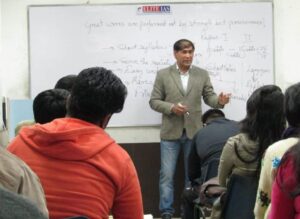
In May 2020, the global COVID-19 pandemic led to widespread lockdowns across India. As a result, educational institutions, including schools and coaching centers, were forced to close. This situation significantly increased the demand for Online Coaching for UPSC.
Notably, Elite IAS Academy in Delhi, renowned for its in-person classes, was the first UPSC coaching institute to offer online coaching, albeit with recorded lectures. This early adoption of digital methods eased their transition to fully online teaching when the pandemic hit.
Currently, online UPSC coaching options seem to outnumber traditional classroom-based IAS coaching. The trend is evident in the growing preference for digital learning. A report by Forbes sheds light on this shift. In 2020, India’s EduTech market was valued at around 500 million USD. The sector is on an upward trajectory. By 2025, it’s projected to reach an impressive 10.4 billion USD. This growth potential is attracting substantial investments. Numerous funds are now investing in Indian EduTech start-ups.
Now, let’s explore why online coaching for UPSC is trending. Here, we will analyze the various types of UPSC online coaching available and their significance.
Different Types of Online UPSC Coaching
(1) Only Video Lectures of Best UPSC Teachers (Pen Drive Mode):
Initially, this method was fundamental in digital learning for UPSC aspirants. It focused on distributing video lectures from top educators in the field. The primary mode of delivery was through pen drives. This approach was especially beneficial in areas with limited or unreliable internet access. It effectively bypassed the need for a constant internet connection. Additionally, it resolved issues related to video buffering.
However, technological advancements have led to significant changes in this methodology. The evolution of digital educational resources is driving this transformation. While it still holds relevance for some students, a shift is occurring. More interactive and internet-dependent learning modes are becoming popular. This change mirrors the evolving needs and preferences of UPSC candidates. They are increasingly seeking dynamic and versatile educational experiences.
(2) Recorded Video Lectures Delivered Online in LMS of UPSC Online Coaching (Learning Management System):
This method is widely adopted by smaller coaching institutions. It involves delivering recorded video lectures via a Learning Management System (LMS). By 2024, it has become the most fundamental form of lecture delivery in UPSC online coaching. This approach is considered the industry’s minimum standard. It provides a basic yet efficient framework for disseminating knowledge. The lectures are carefully recorded and uploaded to an LMS, allowing students to access and review the material at their own pace.
Moreover, this method is highly beneficial for those who favor self-guided study. It makes quality education accessible to those unable to attend live sessions. Time constraints and geographical limitations are no longer barriers. The convenience of this model is a significant advantage. Its accessibility has been pivotal in democratizing UPSC preparation. It ensures inclusivity and adaptability for aspirants from various backgrounds across the country.
(3) Live One-Way Lecture:
A popular method in online UPSC coaching involves instructors holding live sessions. These are often conducted on platforms like YouTube or specialized online education portals. During these classes, teachers use a whiteboard and a large TV screen for their presentations. This setup allows students to visually engage with the material. However, this format typically restricts real-time interaction.
The communication in these sessions is generally one-directional. Students can send typed questions during these sessions. However, whether these questions are addressed is at the teacher’s discretion. This format is similar to large batch-size classrooms. Such classrooms are common in traditional coaching methods.
In many of India’s top IAS coaching centers, the large class sizes can intimidate students, making them reluctant to ask questions. This hesitance can lead to a loss of interest in the subject matter. A similar issue arises in these live one-way online classes. Additionally, this format often features a lower fee structure. This can result in a reduced sense of commitment among students. Over time, the financial investment may seem less significant to them. Consequently, this leads to higher dropout rates from these courses.
(4) Live Interactive Classes for Online UPSC CSE Coaching:
This format represents a two-way, interactive teaching model. It usually involves a smaller group of students. The atmosphere is similar to a traditional classroom setting. Students and teachers engage directly through various communication channels.
The modes of communication in these classes include webcam, microphone, pen tablets, and other digital tools. Students can interact through:
- Audio exchanges
- Video conferencing
- Written (script) communication
A major challenge in online UPSC coaching is feedback-related. There’s often limited capacity for personalized feedback on students’ written work. Live interactive classes address this issue effectively. These classes enable teachers to understand students’ challenges with answer writing closely. This understanding is particularly important for Mains and optional papers, along with test series for UPSC. Teachers can then provide detailed feedback on these written assignments.
These platforms are distinguished by two key attributes. Live interaction and small batch sizes make them a highly attractive choice for online UPSC coaching. However, it’s crucial to note the importance of a robust internet connection. A minimum internet speed is essential for these sessions. Ideally, it should be between 128kbps and 256kbps to ensure smooth and uninterrupted communication.
(5) Hybrid Classes:
Hybrid classes for UPSC coaching merge the traditional classroom environment with the convenience of online learning. This format is designed to cater to the diverse preferences of students. This allow them to choose between attending classes in person or accessing the same sessions online.
The core advantage of this model lies in its flexibility. Students enjoy the freedom to switch between online and offline modes. This flexibility ensures they keep up with the curriculum without missing anything. The method suits various learning styles and personal schedules. It’s a versatile option for UPSC preparation.
Furthermore, hybrid classes frequently employ advanced technology. This technology helps to integrate both online and offline teaching modes seamlessly. Consequently, the quality of education stays consistent across formats. The chosen format does not affect the educational standard. This inclusive approach broadens accessibility for students in various locations. It caters to learners from different geographic backgrounds. Additionally, it creates a dynamic and interactive learning environment. Such an environment is vital for thorough preparation for the UPSC exams.
In conclusion, UPSC coaching methods have evolved significantly. They have transitioned from traditional classrooms to diverse online and hybrid formats. This change mirrors the dynamic nature of education in the digital era. Methods range from pen drive lectures to live one-way sessions. They also include interactive classes and hybrid models. Each method addresses different needs and preferences of UPSC aspirants. These advancements have widened access to quality education. More candidates can now effectively pursue their civil service ambitions.
Looking ahead, the integration of technology in education is set to increase. This promises enhanced flexibility and efficiency in UPSC preparation. Aspirants must make careful choices regarding their coaching methods. The choice should align with their individual learning style. It should also suit their life circumstances. Making the right choice is crucial. It can significantly impact their preparation journey. Ultimately, this can contribute to their success in one of India’s most challenging exams.
Wishing You the Best of Success!



